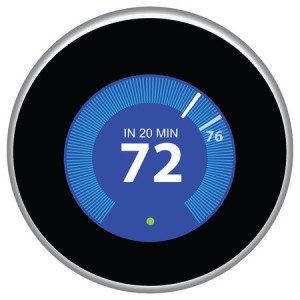 The Internet of Things is a buzzword that you may have heard, and it is quickly emerging as one of the big technology trends of this decade. However, as the functional applications of the various devices that make up this comprehensive network of devices are being worked out, sometimes their shortcomings can be to the detriment of the consumer.
The Internet of Things is a buzzword that you may have heard, and it is quickly emerging as one of the big technology trends of this decade. However, as the functional applications of the various devices that make up this comprehensive network of devices are being worked out, sometimes their shortcomings can be to the detriment of the consumer.
In a recent article in The New York Times, author Nick Bilton looked at the Nest Thermostat. If you’ve been following consumer technology, you know that a Nest Learning Thermostat can be controlled from a homeowner’s smartphone and provides data on energy use, allowing users to more effectively control their energy usage.
While this has a world of potential – as many Internet of Things-related technologies do – the bugs are still being worked out. Bilton told the story of a cold January night when a software bug inside his home’s Nest Learning Thermostat caused the battery to drain and turned off the heat in the couple’s home.
For many, this type of bug may just be an annoyance, but Bilton is the parent to a baby and with temperatures in the home dropping to 64 degrees, he felt the defective product put his child’s health in danger. Such a failure is a real concern – failure of the thermostat in extreme cold can not only be a physical danger to children, the elderly or someone who is ill, but it could also cause physical damage to a structure’s plumbing by allowing pipes to freeze, leading to the potential for expensive repairs and even water damage.
It’s easy to forget that things like a thermostat can have a huge impact, but others have shared comments similar to Bilton’s. Many users have reported their Nest Thermostat losing power and cooling down their house, according to the Times article – a big problem in colder parts of the country in the winter months.
Nest says the bug has since been fixed, but some customers may have to follow a nine-step procedure to restart their thermostat. The Internet of Things holds a lot of promise, but it’s not perfect. As more products come on to the market, make sure to look for bugs and read reviews.
While no serious injuries or deaths have been reported from the Nest failure, other technologies could cause potentially life-threatening problems. As the Times notes, the Fitbit – the ever-popular fitness tracker – failed to “consistently and accurately record wearers’ heart rates,” according to a class-action suit filed in California. For individuals with irregular heartbeats or other cardiac conditions, such a failure could be fatal, so ensuring that new technologies are safe and working well is vital in this Internet of Things frontier.
At the Law Offices of Richard S. Binko, we can work with you to determine your rights and the next steps if you’ve been harmed by a defective product or the failure of a vital device. To learn more or to schedule a consultation with our staff, call us today at 716-895-5500.